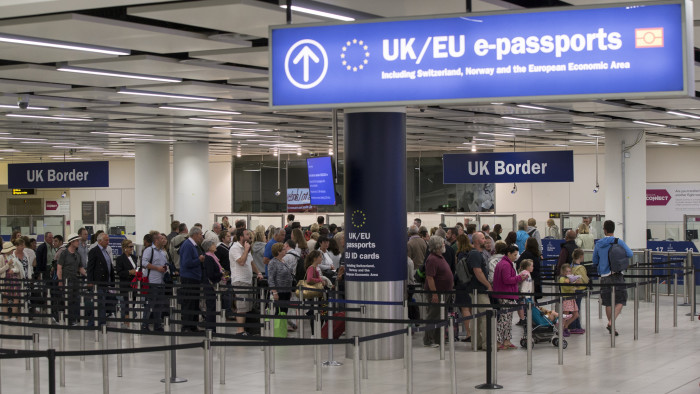Brexit is too high a price to pay over migration

Roula Khalaf, Editor of the FT, selects her favourite stories in this weekly newsletter.
If Britain decides to leave the EU on June 23 it will be because of anger over immigration. No issue is of greater concern to voters who are tempted to back Brexit than the right of Europeans to live and work in the UK. Many believe the bloc’s principle of free movement encourages people from the EU’s poorer nations to take their jobs, put pressure on public services and live off the welfare state. The Leave campaign’s call for Britain to “take back control” of its borders is, for these citizens, a powerful rallying cry.
Some of the anxiety that Britons feel on immigration is understandable. The number of EU migrants coming to the UK has increased sharply over the past few years as the economy has grown. Successive prime ministers have also mishandled the issue badly. Tony Blair seriously underestimated the number of east Europeans who would come to Britain after the bloc’s eastward enlargement in 2004, creating widespread suspicion that immigration was out of control. David Cameron compounded the error by promising to cut net migration to “tens of thousands.” The pledge was impossible to achieve because of the EU’s freedom of movement rules. In the year to September 2015, the figure stood at 323,000.
However, distrust of politicians should not blind voters to the economic facts. Many of the claims about the damage that migration does to the jobs and salaries of Britons are exaggerated. In the UK’s flexible labour market, most employees who are displaced by immigrants soon find other work. This is one reason why unemployment is today as low as it has ever been since Britain joined the European Economic Community in 1973. Nor has EU migration had any discernible effect on wages. The UK government’s own policies — such as increases in the national minimum wage or benefit cuts — have a far greater impact on pay packets.
In some UK regions, a surge in EU migrants has put pressure on the capacity of hospitals and schools. And across Britain, it has compounded an already acute housing shortage. But the claim that migration is a drain on the welfare state is unfounded. EU migrants are on average younger than Britons and overwhelmingly travel to the UK to work rather than to join a family member. Far from being a drain on the UK’s public finances, they are net contributors.
There will always be a limit to the number of migrants that any state can absorb. The Leave camp argues that, if Britain stays in the EU, it will be subject to ever-increasing inward flows as the bloc expands. But the shock of the 2004 enlargement is unlikely to be repeated. Immigrants from existing member states have enjoyed access to the UK for some time and their desire to work in Britain has probably been sated. The likely new entrants to the EU are small Balkan countries and the UK retains a veto on their accession.
The Leave campaign is on even shakier ground when it implies that an end to free movement can easily be implemented in the aftermath of Brexit. If Britain leaves the EU it will want to retain privileged access to the single market of 500m people, the destination for almost half of UK exports. But Norway and Switzerland, while outside the EU, have still been forced to accept free movement of the bloc’s citizens as part of their respective deals to retain single market access. Britain would undoubtedly have to accept the same kind of compromise.
Too often, immigration is blamed for the UK’s social and economic problems when a finger should really be pointed at failures of government policy. Britain needs a substantial increase in the supply of housing, the demand for which would be overwhelming even if pressure from immigrant families did not exist. Ministers must also address the low educational attainment of white working-class children in England. Unless this longstanding problem is resolved, it will destine many young people to a life of low-paid labour, no matter how much competition they face from European workers.
Immigration is a difficult political challenge for nations across the world. But dynamic economies have everything to gain from welcoming talented people on to their soil who want to work. The UK’s choice should be to remain in Europe and invest in sufficient housing and infrastructure to make the flow of EU migrants manageable. The British people’s anxiety over migration will not be easily settled. But Brexit is far too high a price to pay for it.
Comments